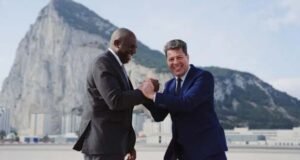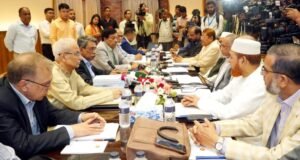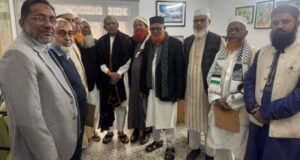 Two bomb explosions targeted a peace rally Saturday by leftist and Kurdish activists in the Turkish capital of Ankara, killing 86 people and wounding 186, the country’s health minister said.
Two bomb explosions targeted a peace rally Saturday by leftist and Kurdish activists in the Turkish capital of Ankara, killing 86 people and wounding 186, the country’s health minister said.
The explosions occurred seconds apart outside Ankara’s main train station as hundreds were gathering for the rally, organized by Turkey’s public sector workers’ union and other civic society groups. The rally was to call for increased democracy and an end to the renewed violence between Kurdish rebels and Turkish security forces.
Authorities were investigating whether the attacks — which struck 50 meters (yards) apart — were suicide bombings. There was no immediate claim of responsibility for the deadliest attacks in Turkey in years.
The attacks came at a tense time for Turkey, a NATO member that borders war-torn Syria, hosts more refugees than any other nation in the world and is holding a general election on Nov. 1.
Authorities had been on alert after Turkey agreed to take a more active role in the U.S.-led battle against the Islamic State group. Turkey opened up its bases to U.S. aircraft to launch air raids on the extremist group in Syria and carried out a limited number of strikes on the group itself. Russia has also entered the fray on behalf of the Syrian government recently, bombing sites in Syria and reportedly violating Turkish airspace a few times in the past week.
Turkish jets have also carried out numerous deadly airstrikes on Kurdish rebel targets in northern Iraq. Some 150 police and soldiers and hundreds of rebels of the Kurdistan Workers’ Party, or PKK, have been killed since July, when the conflict flared anew.
Busloads of activists had travelled to Ankara from other cities to attend Saturday’s peace rally. Health Minister Mehmet Muezzinoglu said 62 of the bomb blast victims in Ankara died at the scene, while 24 others died after being taken to the hospital.
An Associated Press photographer saw several bodies covered with bloodied flags and banners that demonstrators had brought with them for the rally. Police later cordoned off the area.
Television footage from Turkey’s Dogan news agency showed a line of protesters on the street near the train station, chanting and performing a traditional dance with their hands locked, when a large explosion went off behind them.
The video also showed several people later lying injured on the streets or being taken into ambulances. Scuffles broke out between police and family members frantically searching for loved ones or complaining about the poor police response.
“There was a massacre in the middle of Ankara,” said Lami Ozgen, head of the Confederation of Public Sector Trade Unions, or KESK.
Small anti-government protests later broke out at the scene of the explosions and outside of Ankara hospitals as Interior Minister Selami Altinok visited the wounded.
President Recep Tayyip Erdogan condemned Saturday’s attacks, which he said targeted the country’s unity and peace, and called for solidarity.
“The greatest and most meaningful response to this attack is the solidarity and determination we will show against it,” Erdogan said.
Critics have accused Erdogan of re-igniting the fighting with the Kurds to seek electoral gains — hoping that the turmoil would rally voter back to the ruling Justice and Development Party, or AKP. Electoral gains by the country’s pro-Kurdish party caused the AKP, founded by Erdogan, to lose its parliamentary majority in a June election after a decade of single-party rule.
Erdogan denies the accusation.
Prime Minister Ahmet Davutoglu held an emergency security meeting to discuss the attack. His office said he was suspending his election campaign for the next three days.
It was the third attack targeting meetings of Kurdish activists. In July, a suicide bombing blamed on the Islamic State group killed 33 peace activists, including many Kurds, in the town of Suruc near Turkey’s border with Syria. Two people were killed in June in a bomb attack at a pro-Kurdish party’s election rally.
“This attack resembles and is a continuation of the Diyarbakir and Suruc (attacks),” said Selahattin Demirtas, leader of the Turkey’s pro-Kurdish party. “We are faced with a huge massacre.”
Hours after the attack in Ankara, Kurdish rebels declared a temporary cease-fire ahead of Turkey’s Nov. 1 election.
A Kurdish rebel statement said Saturday the group is halting hostilities to allow the election to proceed safely under “equal and fair” conditions. It said it would not launch attacks but would defend itself.
The government has previously dismissed any possible Kurdish cease-fire plans, saying the rebels must lay down their arms and leave the Turkish territory.
 Weekly Bangla Mirror | Bangla Mirror, Bangladeshi news in UK, bangla mirror news
Weekly Bangla Mirror | Bangla Mirror, Bangladeshi news in UK, bangla mirror news






